Birth of a myth: By replacing his top general, Zelensky has laid a trap for himself
Valery Zaluzhny’s political ambitions are boosted by Ukraine’s president, who just removed the commander from leading a doomed war
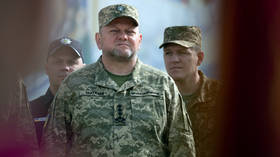
In his masterpiece, the pre-World War II ‘Le fil de l’épée,’ a young Charles de Gaulle observes that soldiers and politicians usually can’t get along well: They’re too different by temperament, socialization, and purpose. And yet the man who would brilliantly succeed at being both a military and a political leader also insisted that, ultimately, they must cooperate to serve their country. That cooperation is precisely what has just broken down in Ukraine, in the middle of a large war that is going very badly for Kiev.
For, make no mistake, while there are several important aspects (discussed below) to the drawn-out dismissal of Ukraine’s commander-in-chief, Valery Zaluzhny, the fundamental fact remains that it is a story of failure, the failure of a key relationship in any state, but especially one fighting a war it is losing.
Zaluzhny, it is important to note, was not a particularly bad commander-in-chief. It is true that Kiev’s war effort is failing but there is no good reason to blame him or, at least, him most of all. He is a mediocre strategist instead of the quiet genius that some silly Western hype used to depict. Yet, the causes of Ukraine’s current, quite-possibly fatal difficulties on the battlefield in logistics and manpower are fundamental, not a matter of one less-than-brilliant general. Remember: Once short on clients, soldiers, and supplies, even Napoleon (and Zaluzhny definitely is no Napoleon) was defeated: There are things in war, especially in a war of attrition, that crushingly outweigh individual talent.
Hence, the ouster of his commander-in-chief is precisely what President Vladimir Zelensky is trying to pretend it is not: a political operation, not a result of level-headed analysis of strategic necessity and a systematic reboot.
It is also an anticlimax: The tensions between Zelensky and Zaluzhny have been no secret for a long time. In particular from January 29, the general’s dismissal was preceded by a wave of leaks and rumors. There was speculation about two key issues: Would Zaluzhny go quietly or would he – or his many supporters, including on the far right – protest, riot, maybe even mutiny and, in the worst case, try to stage a coup against the Zelensky regime? And, if not, who then would succeed Zaluzhny as commander-in-chief?
Two candidates were widely discussed: the head of military intelligence, Kirill Budanov, and the former commander of Ukraine’s ground forces (and thus the core of the military), Aleksandr Syrsky.
Budanov was the more exciting of the two, if in an ill-boding way. While Syrsky’s reputation as a tactically cack-handed, dour “butcher” (of his own men, that is) has reached even the sleepy New York Times, Budanov represented a loose cannon: Bereft of any experience of commanding large forces, the Budanov trademark is black ops: assassination, sabotage, and provocation. Some observers thought that his potential appointment as commander-in-chief would signal a wholesale turn to guerrilla and terrorist methods to compensate for losing the war.
In the end, though, Syrsky, the less colorful candidate, standing for perfect obedience to Zelensky and a particularly unimaginative, if wasteful, type of ordinary warfare, came out on top as Zelensky’s new commander-in-chief (despite plausible rumors that at least the spy-besotted UK was pushing for Budanov); and there have been no coup attempts, riots, or mutinies, either. At least, not yet.
But here is the thing about anticlimaxes: If you feel an outcome does not measure up to what you expected, your disappointment may have less to do with that outcome than with your expectations: You may have anticipated either too much or the entirely wrong kind of thing. In the latter case, you risk missing what is really important, while fixated on all those dogs that did not bark.
Let’s ask two simple questions: First, what things are unlikely to change because of Syrsky replacing Zaluzhny? And in what area, on the other hand, does Zelensky’s move make a difference?
What will not change is that Ukraine is losing this war. Its Western sponsors are either dropping it (the US) or offering it far too little aid (the EU) to even hold out, let alone turn the tables. And even with all the aid in the world, Ukraine could not do so: The country is exhausted. The struggles over a new mobilization law, which were also part of the conflict between Zaluzhny and Zelensky, show two things: First, Kiev is running out of Ukrainians to use up and, secondly, Ukrainians are running out of patience with being fed into their leadership’s proxy-war meat grinder.
In terms of the state budget and the economy as a whole, Ukraine is a hollow shell, kept together and standing only through, again, Western support, which, again, is faltering. Syrsky is a general with a bad reputation. But even if he enjoyed a better one, he would still not be a miracle worker. But that is what it would take to save Kiev. The outcome is a matter of time, now, and probably not much time.
Yet, for the moment the Zelensky regime is not showing any (public) signs of opting for mediation, negotiation, and a compromise peace. Zelensky’s once stellar popularity is declining. In particular it is lagging well behind that of Zaluzhny. Indeed, the increasingly self-centered president is likely to have made things worse: As prominent Ukrainian commenters, like the robustly anti-Russian and warmongering Vitaly Portnikov, have observed, the way in which Zelensky got rid of Zaluzhny was also a PR disaster, for the president. For John Mearsheimer, an always realistic observer, the messy, protracted process of firing Zaluzhny made the president look weak and indecisive.
Zaluzhny, it is important to note, may have been a thorn in Zelensky’s side. But he also was an asset, precisely because, inside Ukraine, he appeared to be a little less dishonest than the usual sycophants serving the self-aggrandizing “servant of the people.” To clear-sighted observers outside Ukraine, Zaluzhny comes across as a savvy general with much-denied yet obvious political ambitions, who has efficiently milked his knack for playing to the crowd with his bullheaded, man-of-the-people/salt-of-the-earth image.
Yet, from within a society living under the deeply reality-phobic Zelensky regime, addicted to self-dramatization, spin, and lying, Zaluzhny looks like a rare straight-talker who, occasionally at least, has dared speak truth to power. This is a point made, for instance, by Ukrainian journalist Ianina Sokolova, who has deplored the inability of Zelensky and his team to tolerate or accept criticism and has praised Zaluzhny for telling the truth about the “dead end” that the war has become.
Yet the Zelenskyites will not give up and, in a deeply unpatriotic way, that makes sense: Zelensky and his team are very unlikely to survive (politically, at least) the coming defeat. And by now their military position is so bad that even they probably understand that they will not be able to spin the end as anything else. They are trapped.
And, finally, what will not change either is the deep influence of the Ukrainian far right on the country’s politics. For the fact that the far-right groups have not rebelled against Zaluzhny’s ouster is not a sign of its weakness. On the contrary, it shows two things: First, not only Zaluzhny but Zelensky as well, of course, has his leverage with the far-right movement and they their investment in him. Secondly, the far right has decided to bide its time: Why try to take over now, just to own a losing war?
And that question brings us to what has changed.
Zelensky’s problems have increased. Not only because he has gone against a man much more popular than he is himself, but also because his chosen general, Syrsky, is ethnically Russian – to the extent that he still speaks Ukrainian with a Russian accent. It is true that much of his Russian family has disowned Syrsky, but that won’t help him much once Kiev’s defeat moves from the realm of the very likely to that of accomplished fact. Then, the search for scapegoats will be on (again), and Syrsky’s lack of ethnic credentials will be used against him, not only by the far right as a whole but also by top Zelensky rivals (and Zaluzhny allies), such as former president Poroshenko or Kiev’s always-ambitious mayor Vitaly Klitschko. And Vladimir Zelensky will be blamed for appointing “the Russian.”
Zelensky’s exposure to the political cost of battlefield setbacks has also grown: He has not, of course, repeated the grievous mistake of former Russian emperor Nicholas II, who took over military command in the middle of World War I and thus made himself a perfect target. But, in principle, Zelensky has run a similar risk: When the war turns even worse than now, Ukrainians will ask who was responsible for replacing a commander-in-chief they at least believed in with one most of them dread. And they will also ask about Zelensky’s reasons, which are obvious, no matter how much the president tries muddying the waters: Zaluzhny had to go because Zelensky fears his political potential.
Which brings us to the third thing that is different now: Ironically, Zaluzhny’s chances in future Ukrainian politics have greatly improved, thanks to Zelensky’ short-sighted attempt to curtail them. The president has removed the commander-in-chief from responsibility before defeat can harm his image. Indeed, Zelensky has laid the foundations of a future myth, in which Ukrainians will tell each other that all could have been different, if only good old Zaluzhny had not been kicked out. It won’t be true, but it will be resonant.
One statement Zelensky has made with respect to Zaluzhny may very well come to haunt him. Asked about his relationship with his top general, before the commander was replaced, the president answered that one day Zaluzhny might not be around anymore and that “Ukraine as a state is not about the personal.” Indeed. Nor should it be. But it’s a risky thing to stress for a man whose whole legitimacy is based on what is, in effect, a personality cult. A badly declining one.
The statements, views and opinions expressed in this column are solely those of the author and do not necessarily represent those of RT.
https://www.rt.com/russia/592312-zelensky-replacing-top-general-zaluzhny/
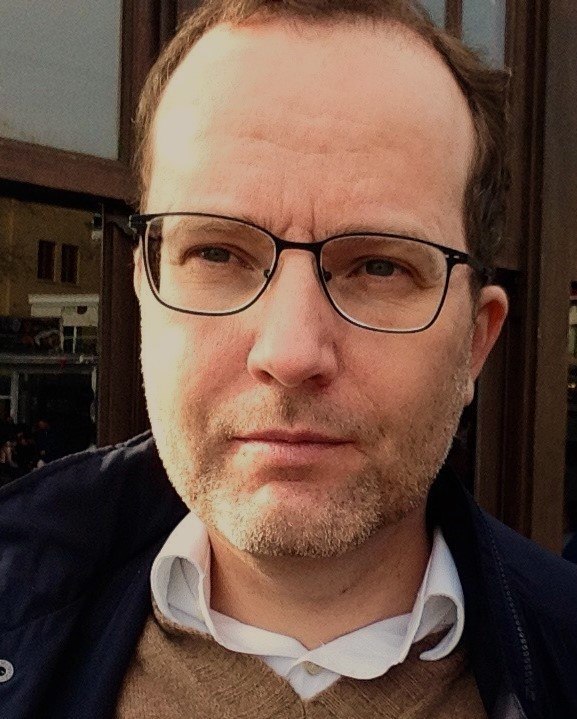
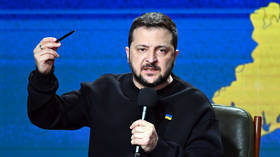
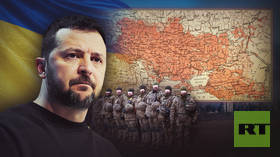
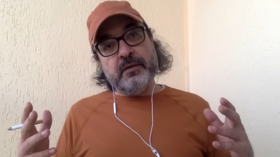

0 Comments:
Post a Comment
Subscribe to Post Comments [Atom]
<< Home